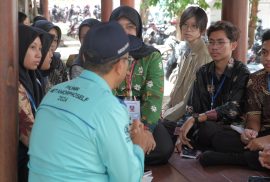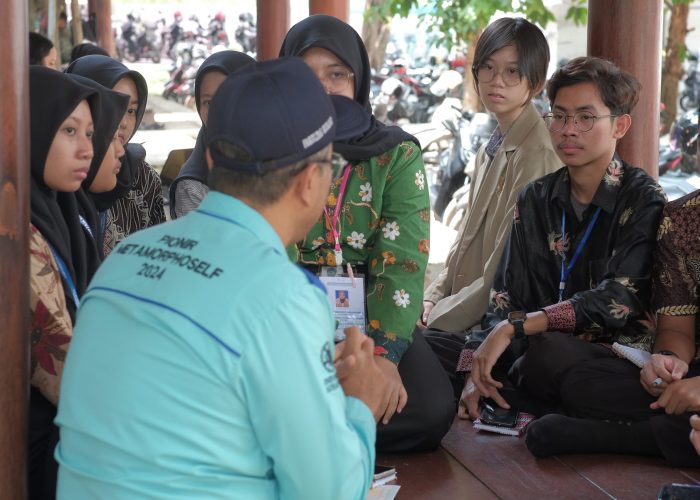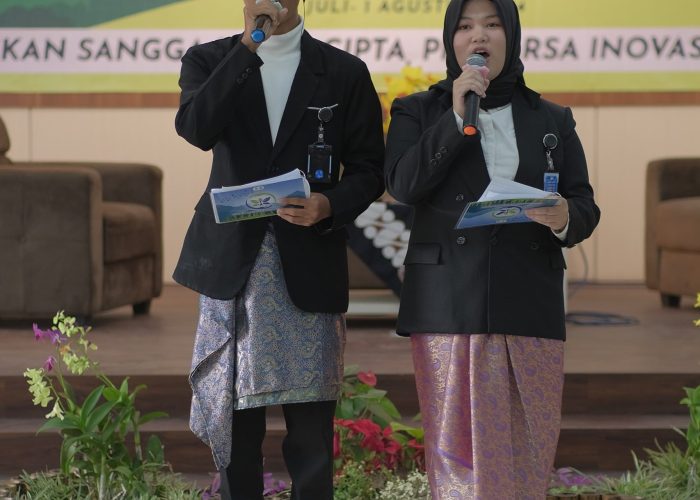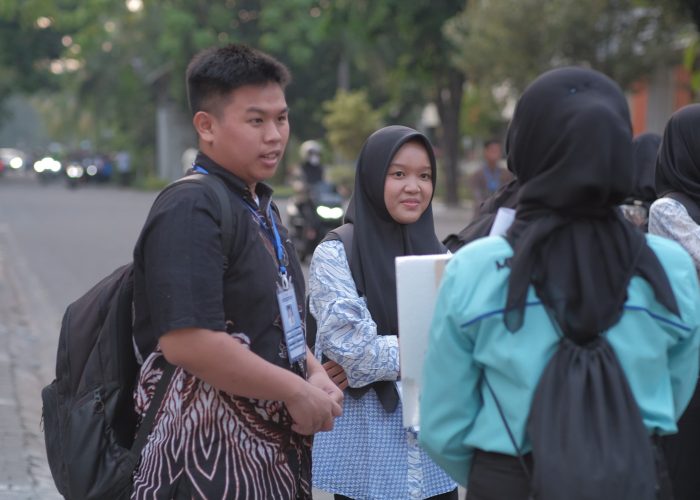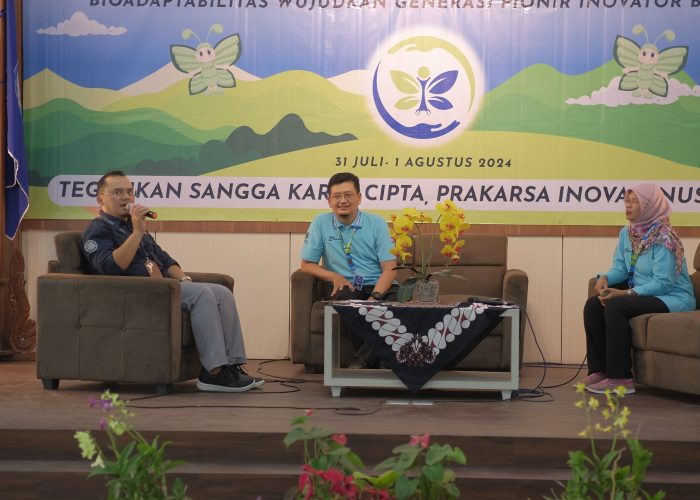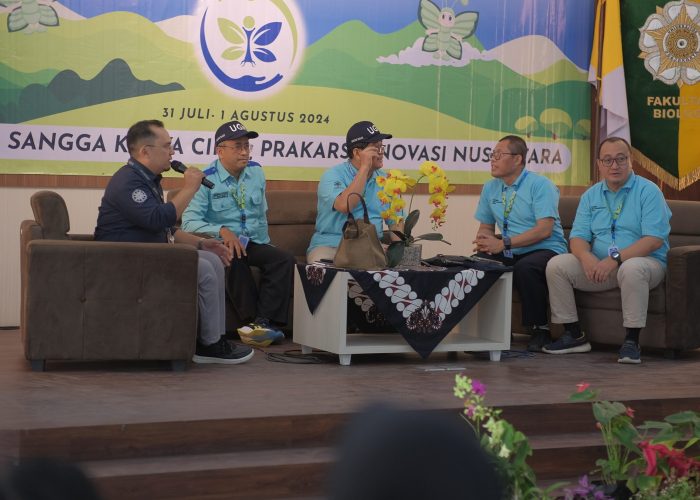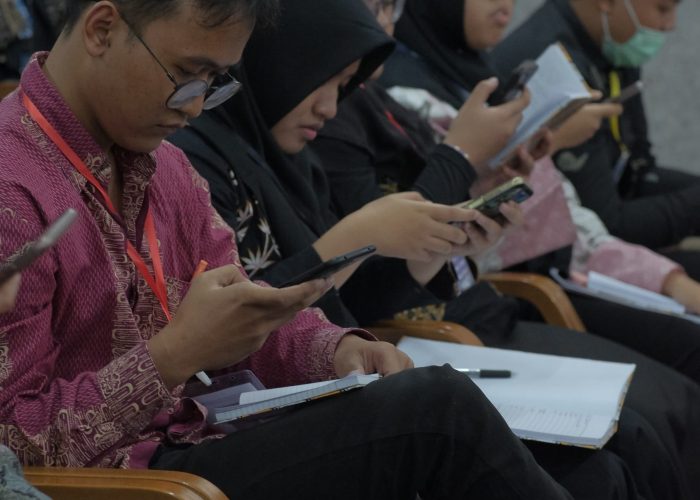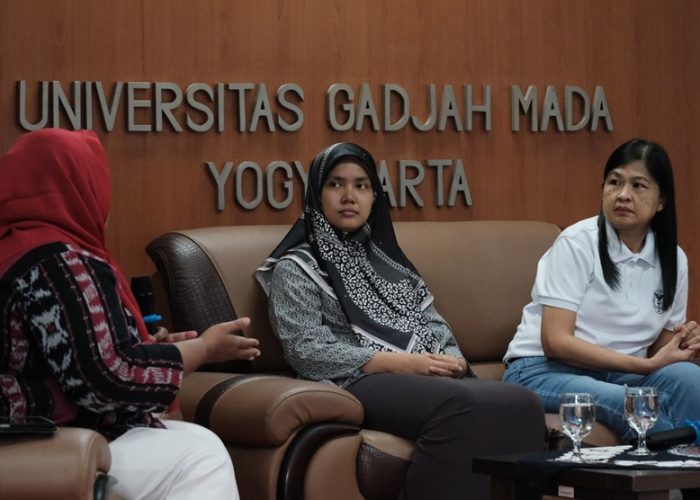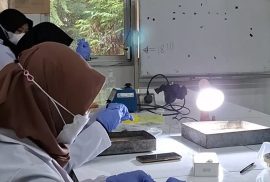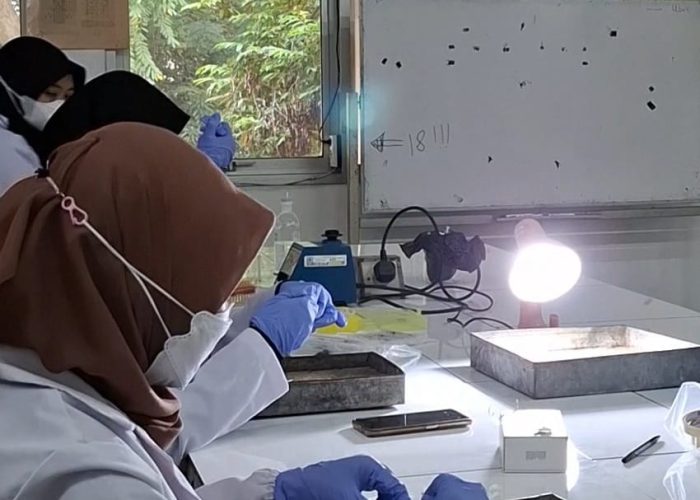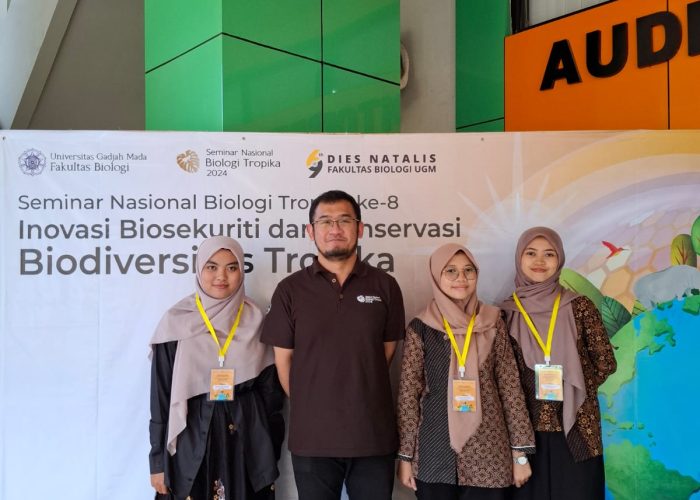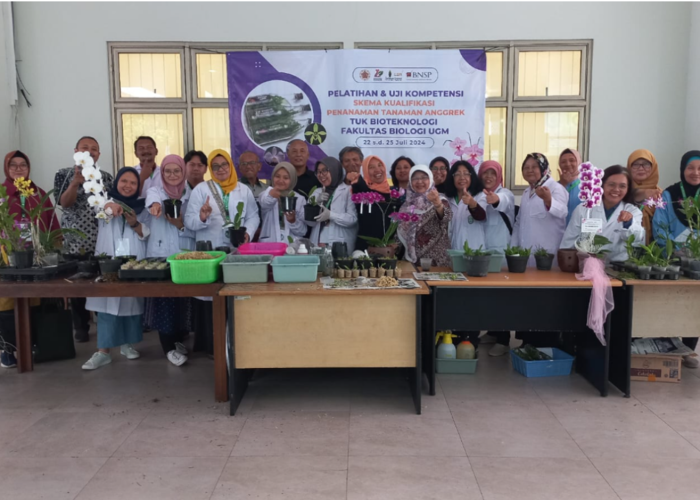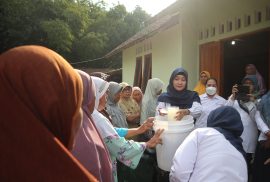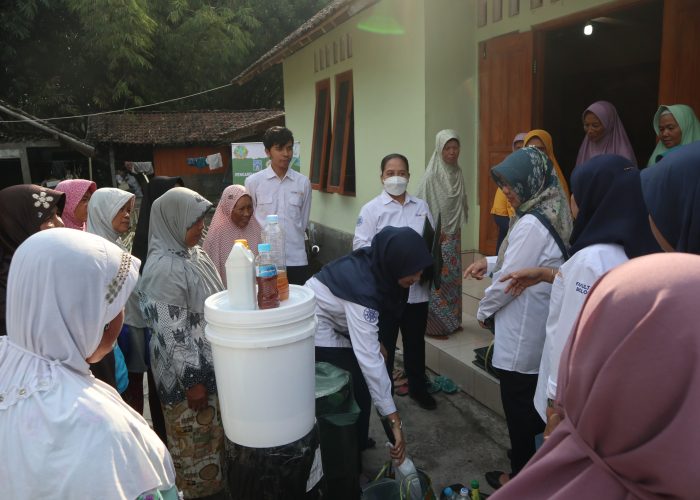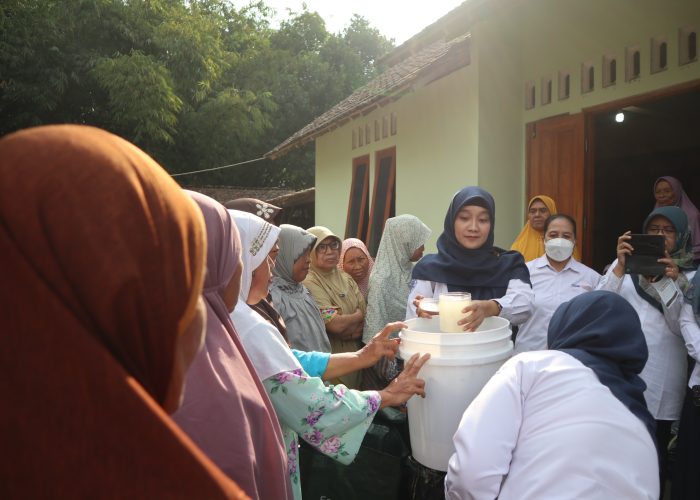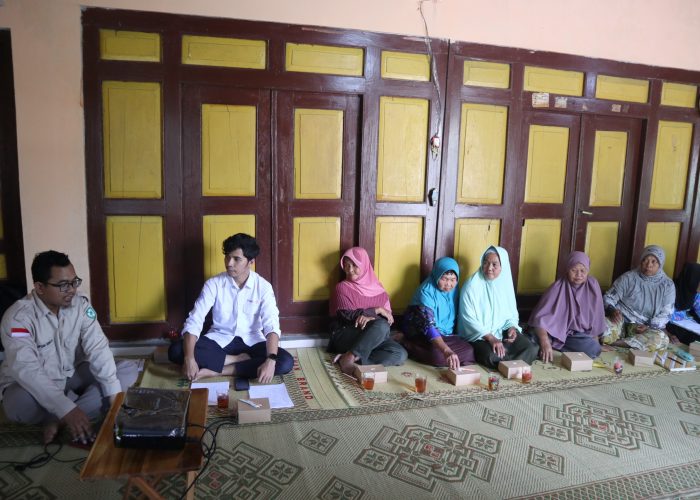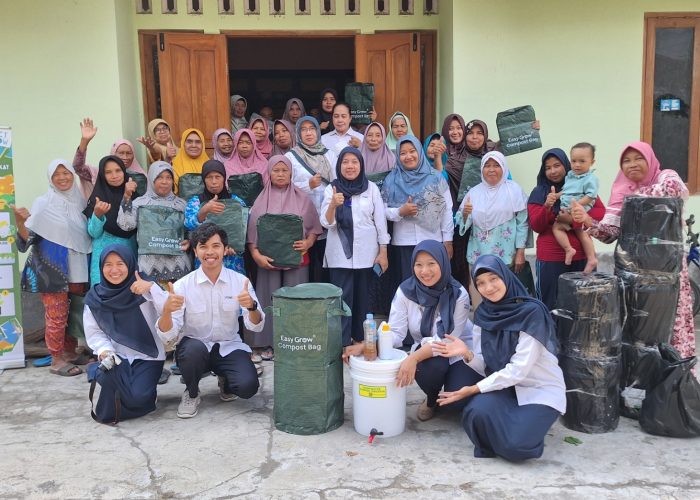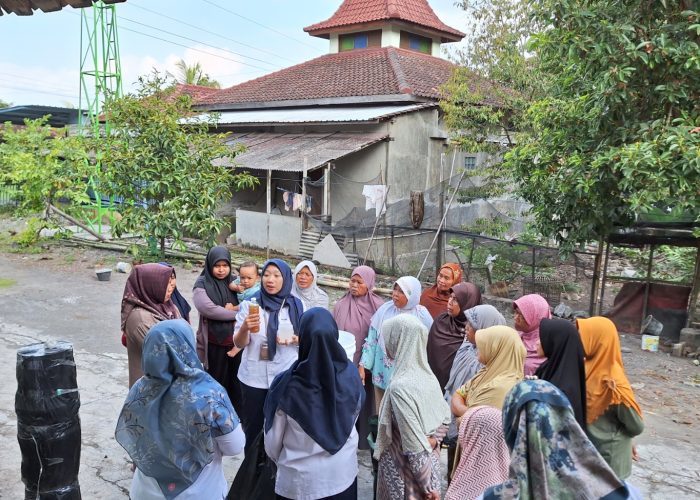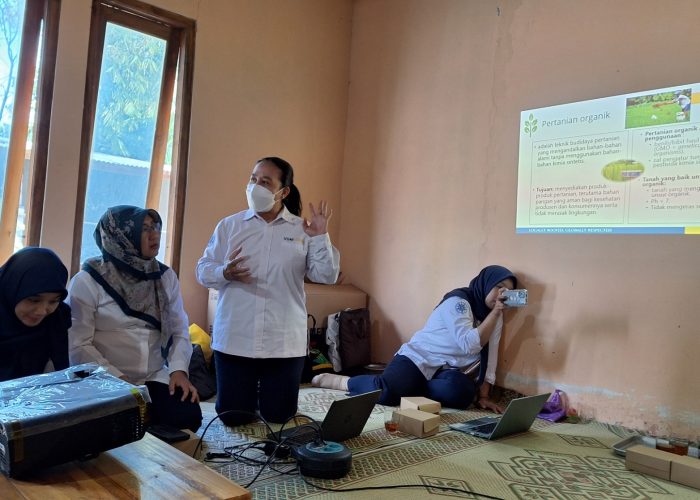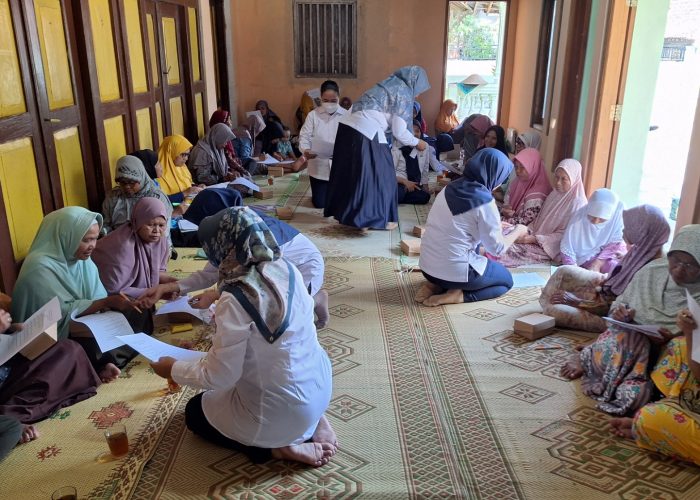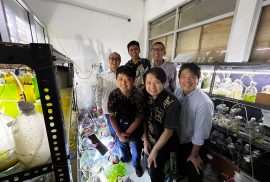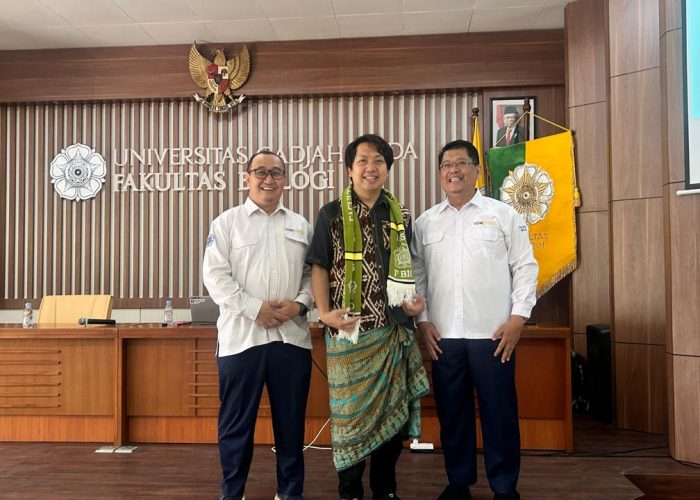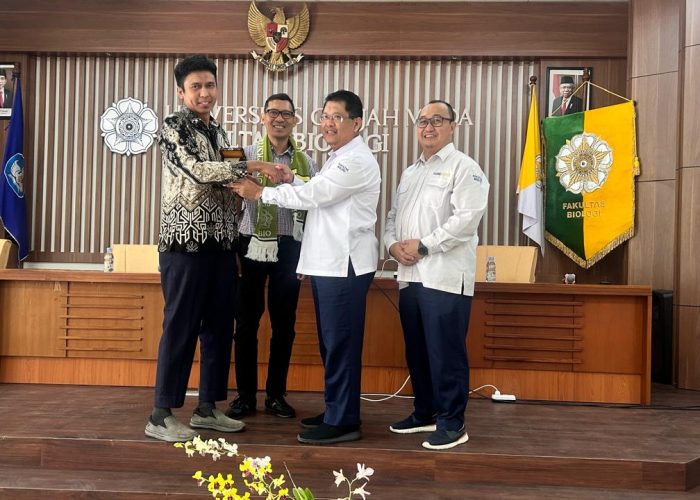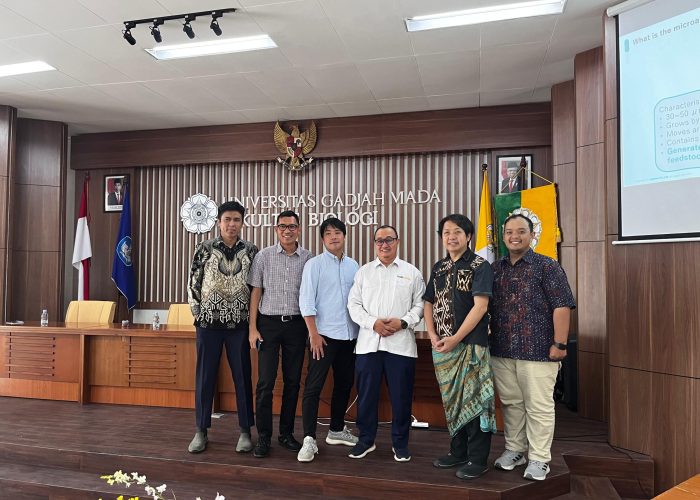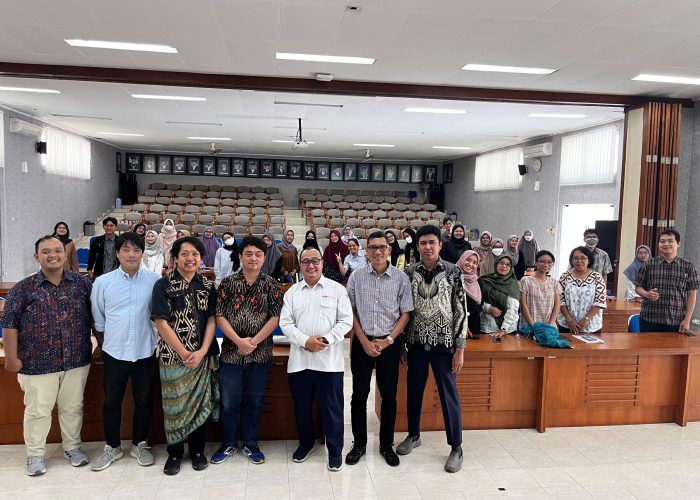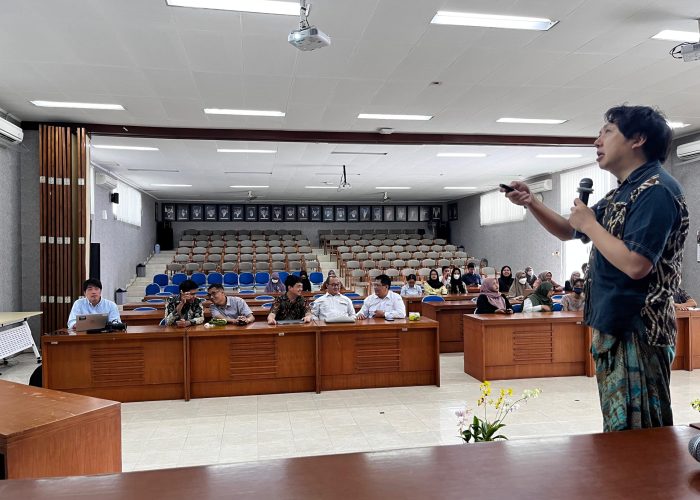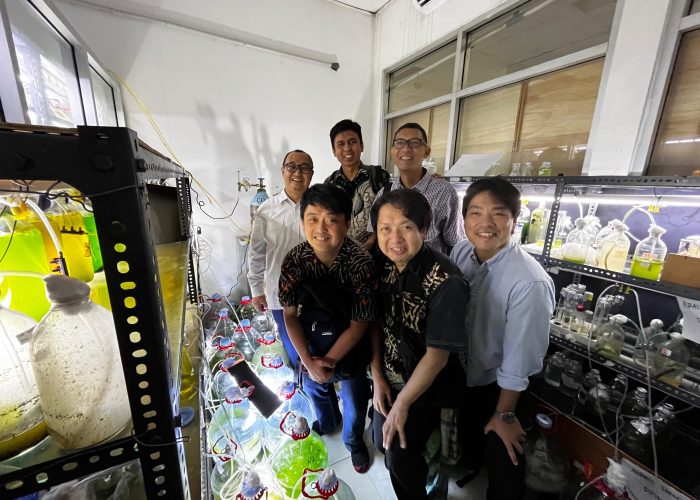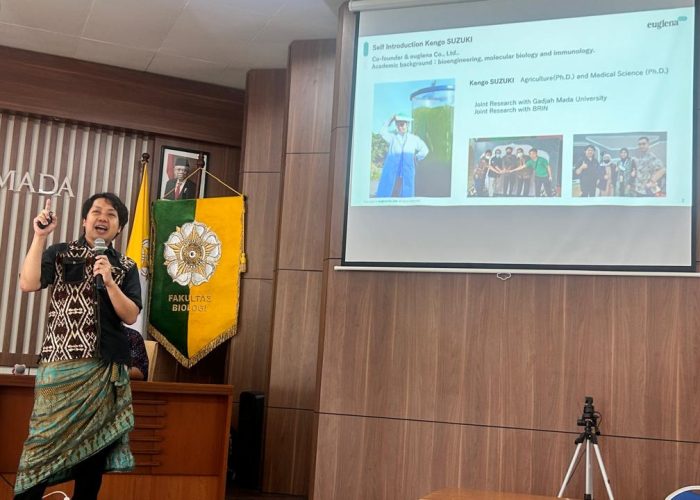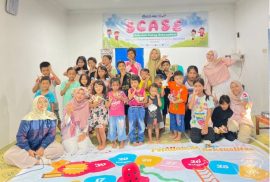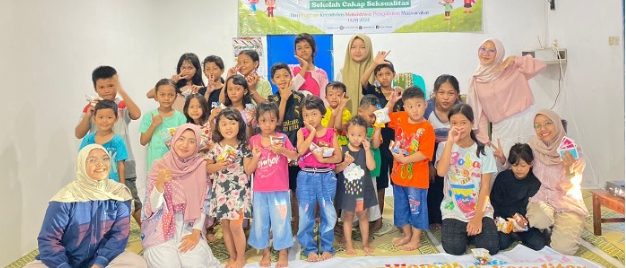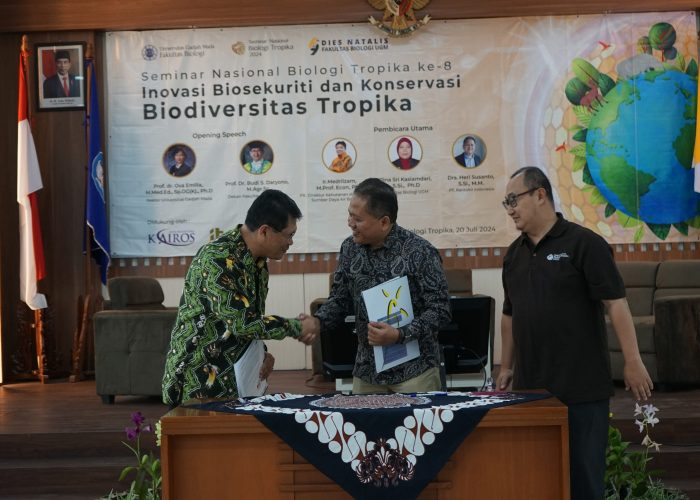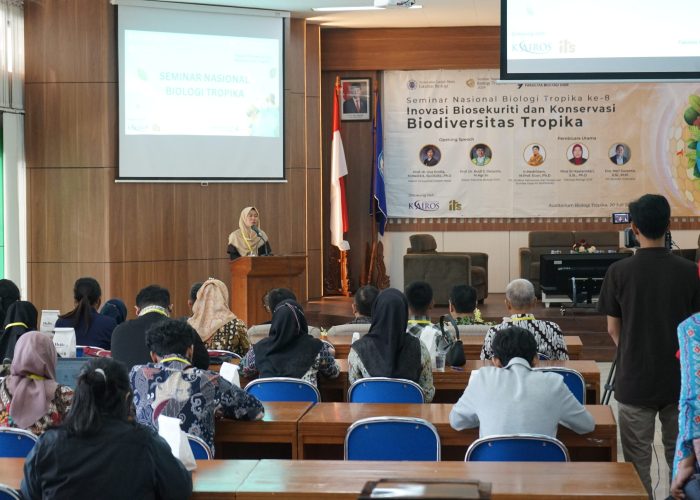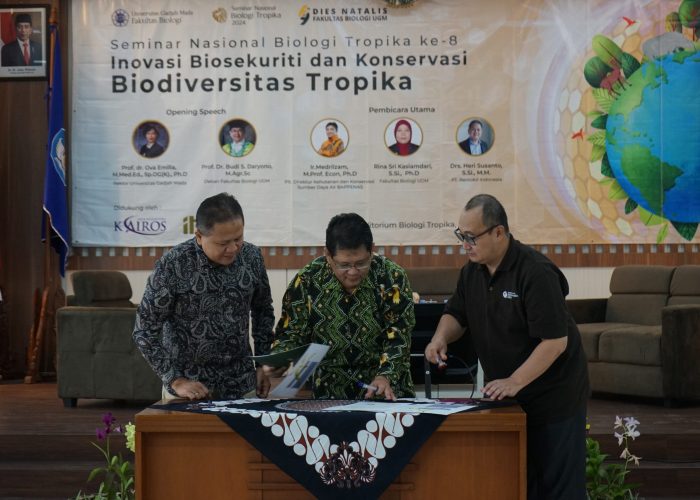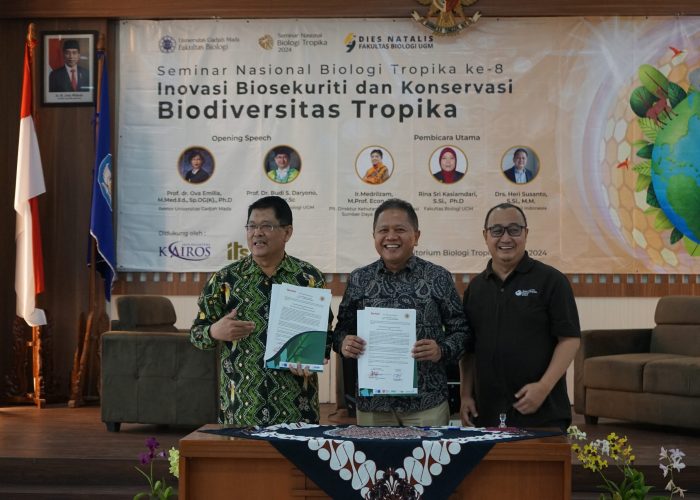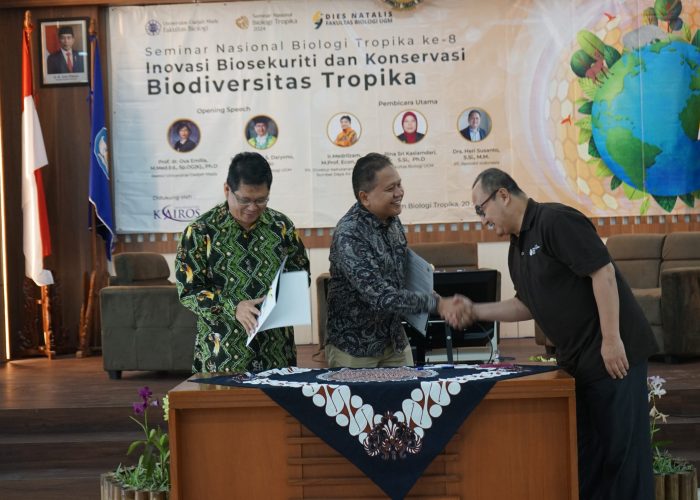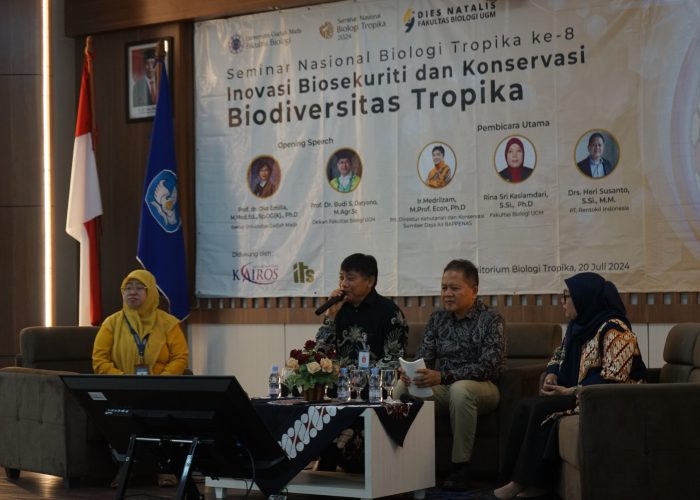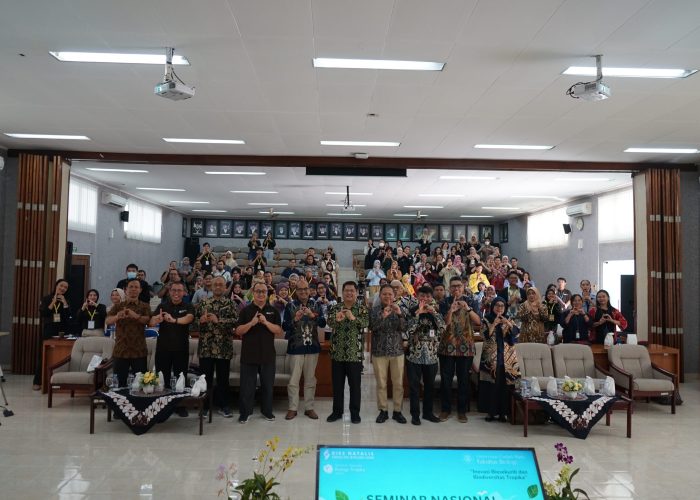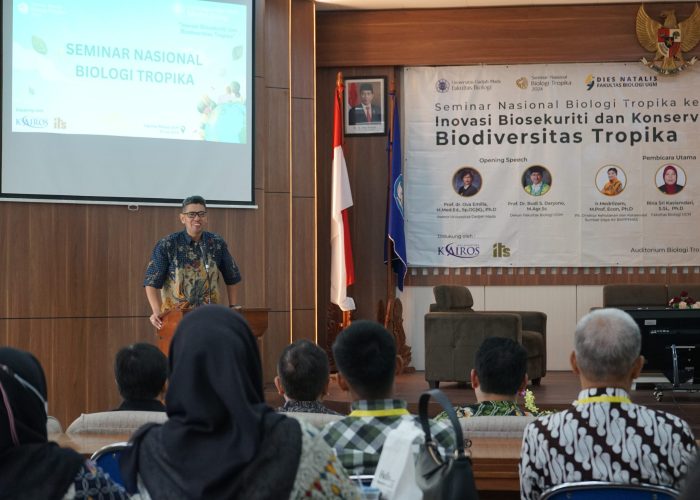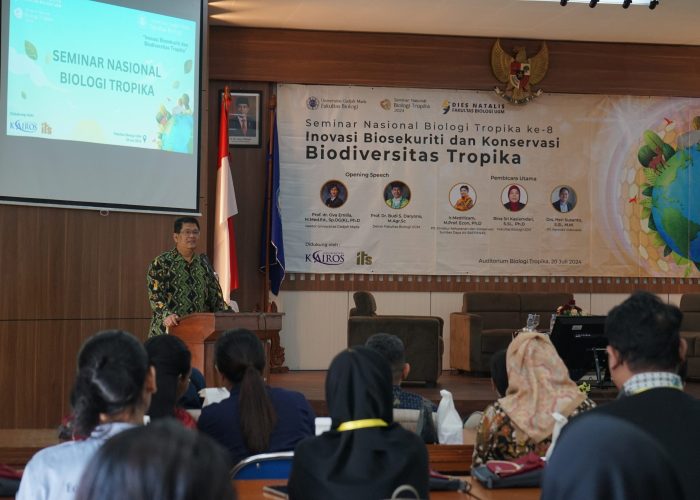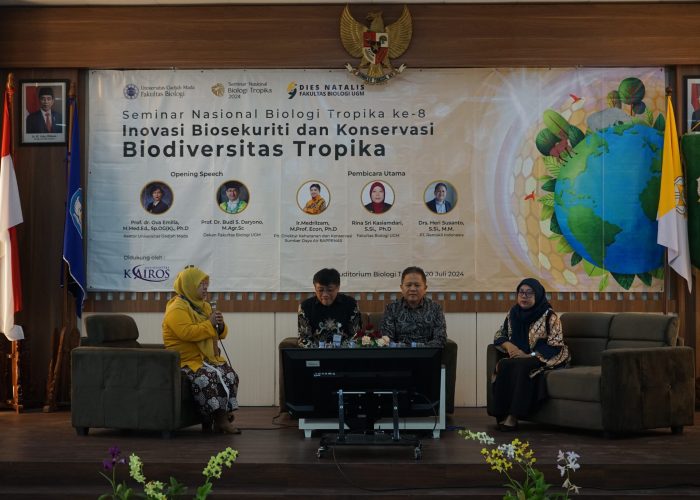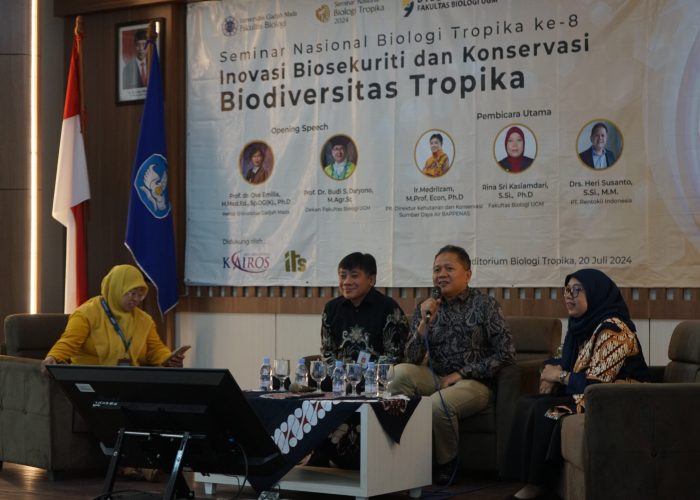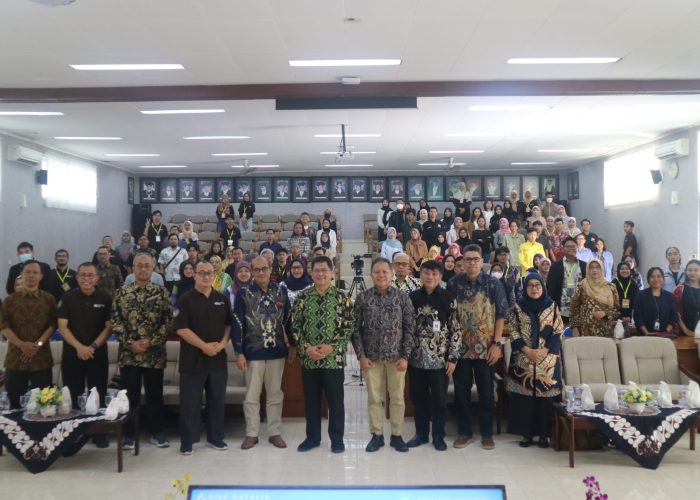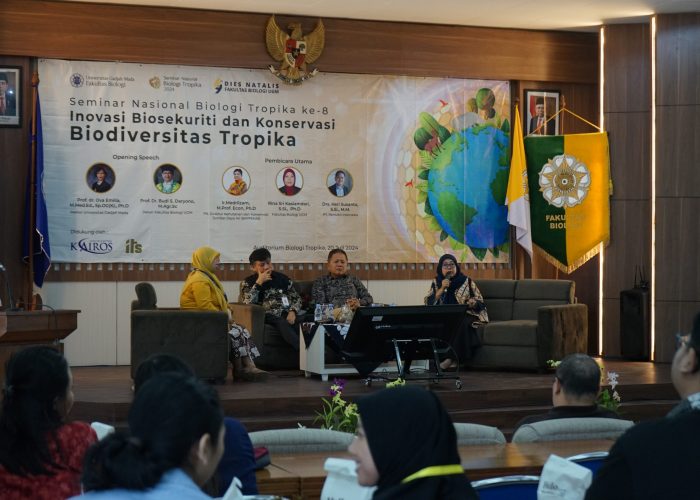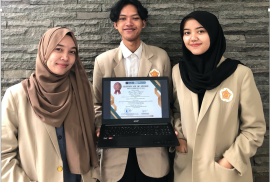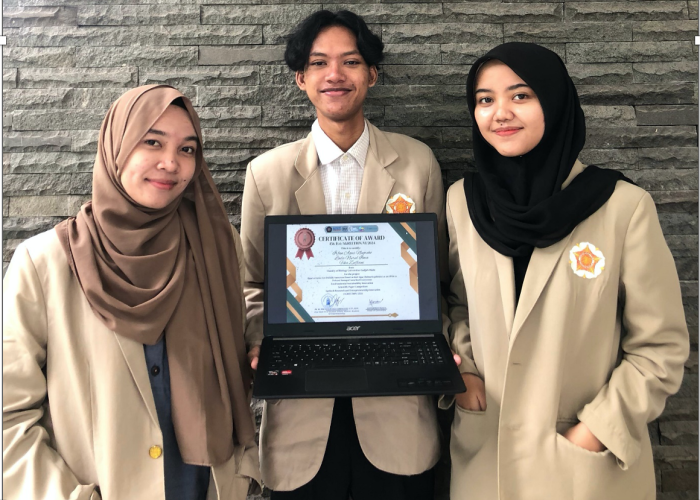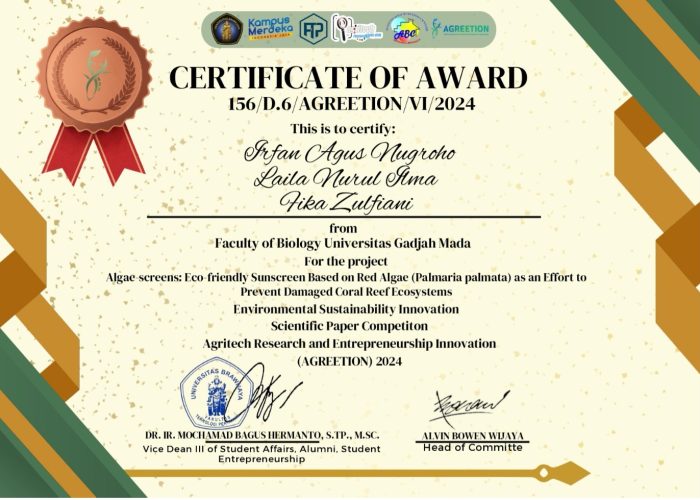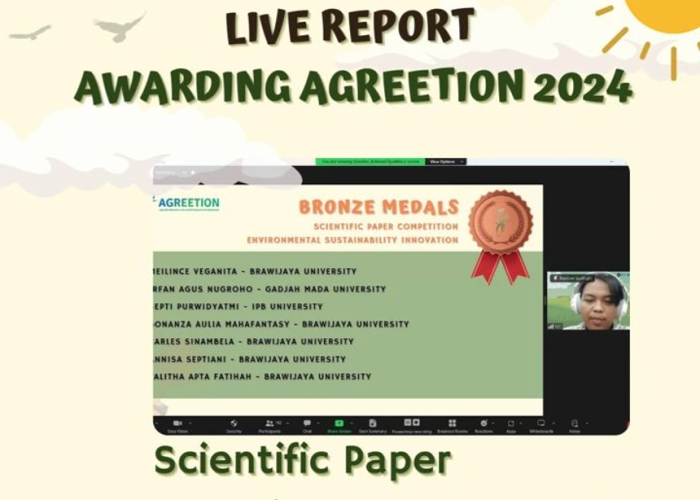Arsip:
SDG 3 : Establish Good Health and Well-Being
On Wednesday, July 31, 2024, the Faculty of Biology UGM opened the series of the PIONIR Metamorphoself 2024, an annual event organized by the Faculty of Biology to welcome young biologists, as an introduction to the faculty and prepare them for their academic journey at UGM. The PIONIR Metamorphoself 2024 carried the theme ‘’Bioadaptability: Realizing a Generation of Pioneer Innovators for the Nation’’. Through this theme, it hoped that young biologists can excel and create in various fields of study, adapting to the transition from school to university.
The first day of PIONIR Metamorphoself began with the opening ceremony at 7:30 AM. The ceremony was opened with a welcome speech from the General Coordinator of PIONIR Metamorphoself 2024, Muhammad Syahrul Firdaus, followed by a speech from the Cluster Coordinator, Tyas Ikhsan Hikmawan, S.Si, M.Si, Ph.D.. Next, there was a speech from the Dean of the Faculty of Biology UGM, Prof. Dr. Budi Setiadi Daryono, M.Agr.Sc and officially opening the PIONIR Metamorphoself 2024, symbolized by the installation of a deer replica at Terra Nova. After the opening ceremony, young biologists attended several sessions.
The first session was a talk with the faculty leadership, Prof. Dr. Budi Setiadi Daryono, M.Agr.Sc., the Dean of the Faculty of Biology, Dr. Bambang Retnoaji, M.Sc, Vice Dean for Academic and Student Affairs, Dr. Slamet Widiyanto, M.Sc., Vice Dean for Finance, Assets, and Human Resources, and Dr. Eko Agus Suyono, M.App.Sc., Vice Dean for Research, Community Service, Cooperation, and Alumni Affairs. This session was moderated by Dr.rer.nat. Abdul Rahman Siregar, S.Si., M.Biotech, aimed to introduce young biologists to the organizational structure, facilities, and assets of the Faculty of Biology. The Vice Deans also explained academic and non-academic activities at the Faculty of Biology, collaborations with national and international institutions, and highlighted successful graduates in various fields.
Next was a session featuring Emi Dwi Suryanti, S.Si, M.Sc, Coordinator for Academic and Student Affairs, and Sukirno, S.Si., M.Sc., Ph.D., Head of the Bachelor in Biology Study Program, provided an overview of administrative systems, lectures, permissions, length of study, and exam requirements. Tips for young biologists to adapt to the Faculty of Biology at UGM were also shared, followed by a Q&A session.
After these sessions, young biologists participated in a quiz based on the materials presented during the leadership and academic coordinator talks. The next session was an introduction to the faculty lecturers, guided by MCs Angga Firza Pratama and Birrul Qisty Mutmainnah Nazara. The faculty lecturers were introduced in sequence according to their laboratories. Following the faculty lecturers introductions, young biologists participated in a bonding session with their Academic Supervisors (DPA). They directed to their DPA’s location based on a faculty map, guided by instructors. During this session, they received information about plagiarism and shared experiences about university life with their DPAs.
Yogyakarta, 29 July 2024 – The 7th International Summer Course in Sustainable Development: Sustainable Bioprospecting of Tropical Biodiversity is officially opened. This annual event organized by the Faculty of Biology, Universitas Gadjah Mada, started its offline agenda after opening its online session Monday (15/7) which was followed by a series of guest lectures from various experts from around the world.
At least 33 offline participants took part in the opening of the International Summer Course (ISC), located in the Seminar Room, Library and Archives Building, Universitas Gadjah Mada. The participants consisted of 27 international students and 6 local students. Coupled with online participants, this year ISC succeeded in attracting 58 participants from 14 countries including Indonesia, Malaysia, Japan, the Philippines, Thailand, Pakistan, the Netherlands, the United Kingdom, India and Egypt.
“Let’s leverage our collective wisdom to foster biodiversity for a greener, more resilient world,” said Dr. Eko Agus Suyono, M.App.Sc., Vice Dean for Research, Community Service, Collaboration and Alumni Affairs, Faculty of Biology UGM in his speech, Monday (29/7).
Ir. Wiratni, S.T., M.T., Ph.D. as Secretary of the Directorate of Global Partnerships and Relations at UGM then delivered her remarks. She expressed her welcome and appreciation for the arrival of participants from various countries to take part in the summer course this time. ISC was officially opened by awarding pins and hats to two participant representatives by Dr. Eko and Dr. Wiratni, followed by a Kalimantan traditional dance performance by postgraduate students from the Faculty of Biology UGM.
The next series of offline lectures was held after the opening of ISC on Monday morning, presenting speakers from various countries. The lecture series began with the first panel presentation by Dr. Siti Fatimah from Universiti Tun Hussein Onn Malaysia, and Dr. Alona Linatoc from the University of the Philippines Los Banos, moderated by Ludmilla Fitri Utari M.Si.. The two panelists delivered material on the topic of ethnobotany, highlighting the interaction and role of the ecosystem environment and humans in it. Ethnobotany emphasizes the various cultures of various regions and how the people in them use local plants and their ecosystems (SDG 15).
The second panel presented two panelists from the Institute of Animal Hygiene and Veterinary Public Health, University of Leipzig, Germany, Dr. Ahmed El Wahed and Prof. Uwe Truyen with moderator Dr. Abdul Rahman Siregar. Both delivered material related to maintaining biodiversity for sustainable health “One Health”. Both touched on The One Health Joint Plan of Action through collaboration involving various parties, researchers from various parts of the world to alleviate world health problems (SDG 3).
The next panel related to natural products and bioprospecting was presented by Dr. Tri Rini Nuringtyas from the Faculty of Biology UGM, and Dr. Nor Ismaliza from Tunku Abdul Rahman University, Malaysia, moderated by Woro Anindito Sri Tunjung, Ph.D. Dr. Nuning and Dr. Nor delivered an interactive presentation regarding the use of various natural materials into products with potential economic value (SDG 15 and 8).
The final panel, entitled Genetic Bioresource, was delivered by Konsorn Srikulnath, Ph.D. from Kasetsart University, Thailand, moderated by Dr. Aprilia Sufi Subiastuti. He explained about the research unit at his institution “Animal Genomic and Bioresource Research Unit” (AGB Research Unit) which focuses on studying animal genomics including bulls (genetic monitoring), chickens (increasing gene varieties), fish and crocodiles (SDG 14 and 15).
All participants were enthusiastic in attending the series of openings and lectures. The activities will be continued with cultural trips and field lectures with various interesting destinations related to the big theme of this year’s summer course, bioprospection. The 7th International Summer Course in Sustainable Development is expected to become a forum for collaboration between students, lecturers and researchers, and become a discussion forum for increasing the potential for sustainable education and research (SDG 4 and 17).
The Averin team (Antivenom use Tamarind) from UGM discovered the potential of tamarind seeds (Tamarindus indica) as an alternative treatment for ground snake (Calloselasma rhodostoma) bites. This research was conducted by Oktaviani Nisa Hanafiah (Veterinary Medicine), Fauzela Azira Ainaya (Biology), Fani Nur Maftukhah (Pharmacy), Rahmadina Nur Azizah (Pharmacy), and Khansa Fortuna Putri (Veterinary Medicine). The research was funded by the Ministry of Education, Culture, Research, and Technology (Kemendikbudristek) and Universitas Gadjah Mada. It hoped that this support will help address the issues of access and cost of snake bite treatment.
“This research aims to provide a theoretical foundation and preclinical data on the effectiveness of T. indica seed extract against C. rhodostoma snake bites. The results of this study could contribute to alternative treatments, reducing mortality rates from C. rhodostoma bites in Indonesia,” said Oktaviani.
Oktaviani emphasized the importance and urgency of this research. “According to WHO data, Indonesia experiences around 135,000 snake bite cases annually, with a mortality rate of 5-10%. The C. rhodostoma snake is a significant cause of death in Java. However, the Antivenom Serum (SABU) for these snake bites is not widely available and remains expensive,” Oktaviani added.
The tamarind seed extract was tested in vivo against C. rhodostoma venom, showing that in the group treated with tamarind seed extract, the hemorrhagic area was significantly smaller compared to the group treated with snake venom alone. Therefore, T. indica shows promise as a new treatment for snake bites, especially for C. rhodostoma. Our dedication to this research drives us to continue exploring nature’s potential to enhance human life, Oktaviani stated. These findings were presented at the National Seminar on Tropical Biology (SNBT) on July 20, 2024. [Author: Fauzela Azira Ainaya]
Yogyakarta, July 25, 2024 – The Faculty of Biology Universitas Gadjah Mada (UGM) successfully conducted training in Orchid Cultivation and a competency test for Orchid Planting Practitioners qualification. The Dean of the Faculty of Biology UGM, Prof. Dr. Budi Setiadi Daryono, M.Agr.Sc., officially opened the training on July 22, 2024. The training had 16 attendees, while the competency test saw participation from 22 individuals hailing from different regions across Indonesia, comprising academics, practitioners, alumni, and students. The event successfully enhanced the participants’ knowledge and skills in orchid cultivation.
The intensive three-day training, from July 22 to 24, 2024, focused on orchid planting techniques, from preparing planting media to caring for mature plants. The training materials were presented by orchid experts, including Prof. Dr. Endang Semiarti, M.S., M.Sc., and Aries Bagus Sasongko from the Faculty of Biology UGM, Dr. Ixora Sartika Mercuriani from Yogyakarta State University, and Eniek Sulistyanti, an experienced orchid practitioner. The training covers theoretical and practical sessions on planting bottled orchid seedlings, repotting, grading, sorting orchids, and post-harvest handling of orchids. The training was a collaboration between the Laboratory of Biotechnology Faculty of Biology UGM and Orchid Enthusiasts Association (PAI) DPD DIY.
“This training aims to enhance participants’ knowledge and skills in orchid cultivation, thus contributing to the development of the orchid industry in Indonesia,” said Prof. Dr. Budi during the opening ceremony.
After the training, participants took the competency test held at the Biotechnology Competency Test Center, Faculty of Biology UGM, on July 25, 2024, with assessors from the National Agriculture Professional Certification Agency (LSP) Malang, Drs. Surini Santosa, M.Si., Ari Setyowati, M.P, and Drs. Kaswan Badami, M.Si. The exam assesses participants’ competencies, consisting of 24 competency units required by orchid planting practitioners. Coordinator of the Biotechnology Competency Test Center, Prof. Dr. Endang Semiarti, M.S., M.Sc., welcomed the enthusiasm of the competency test participants, marking the first batch for Orchid Planting Practitioner competency at the Biotechnology Competency Test Center, Faculty of Biology UGM.
“Competency certification is important for orchid cultivation business actors, as it can enhance the competitiveness of their products in the market,” said Drs. Surini Santoso, M.Si., in his speech as Director of the LSP Agriculture Malang. The Vice Dean for Research, Community Service, Collaboration, and Alumni Affairs officially opened the Competency Test. He stated, “Besides the competency for Orchid Planting Practitioners, the Biotechnology Competency Test Center also holds Competency Tests for other competencies such as Plant Tissue Culture and invites participants to take the competency test scheduled for late 2024.”
The competency test results announced on Thursday afternoon showed that all participants were recommended as competent. Responding to the recommendations, all participants were happy and hoped to continue orchid cultivation activities in their respective places. (A.B. Sasongko)
To carry out higher educationTri Dharma, The Faculty of Biology UGM initiated the Partner Village program at Wukirsari Village, Cangkringan District, Sleman Regency, Yogyakarta Province. A memorandum of understanding was signed between the Dean of the Faculty of Biology UGM, Prof. Dr. Budi Setiadi Daryono, M.Agr.Sc., and the Head of Wukirsari Village, Mr. Handung Tri Rahmawan, on June 5, 2024, for community service activities with a duration of 5 years. The 2024 activities focus on the Integrated Agriculture Development program incorporating waste management and processing. The proposing team from the Faculty of Biology UGM for the Wukirsari Partner Village program is chaired by Rina Sri Kasiamdari, S.Si., Ph.D., with members including Prof. Dr. Diah Rachmawati, S.Si., M.Si.; Dr. Maryani, M.Sc.; Dr. Eko Agus Suyono, M.App.Sc.; Utaminingsih, S.Si., M.Sc.; Dr. Aprilia Sufi Subiastuti, S.Si.; Dr. Siti Nurbaiti, S.Si.; Novita Yustinadiar, S.Si., M.Si.; and Dr. Wiko Arif Wibowo, S.Si.
The first activity was held on Monday, July 22, 2024, in Sruni Hamlet, targeting the PKK (Family Welfare Empowerment) group. This activity focused on introducing waste, economically valuable waste management, and organic waste processing. Rina Sri Kasiamdari, the team leader, stated that this activity will be conducted continuously, starting with waste introduction and processing, hydroponics and microalgae introduction, and using organic fertilizers from waste processing for home gardening. “The issue of waste management needs special attention from all of us in the Special Region of Yogyakarta, including Sleman, especially since waste management has returned to the local government,” said Rina in her speech.
The presentations began with Ria Karyanto, S.Kom., discussing waste banks and continued with an introduction to organic fertilizers delivered by Dr. Maryani, M.Sc.. Next, Novita Yustinadiar, S.Si., M.Si., conducted training on making solid organic fertilizers, and Dr. Aprilia Sufi Subiastuti, S.Si., led a session on creating liquid organic fertilizers. This session was attended by 37 PKK members from Sruni Hamlet. Based on the questionnaires and testimonials from the PKK group, the community generally did not know about the types of waste, waste management, and waste processing into organic fertilizers. During the first activity of the Partner Village program, compost bags were distributed to each resident for home application, and compost buckets distributed to groups of residents, which were monitored monthly by the team.
This program is related to various aspects of the SDGs (Sustainable Development Goals), particularly SDG number 11 (Sustainable Cities and Communities) and 12 (Responsible Consumption and Production), but also related to SDG number 3 (Good Health and Well-Being), 6 (Clean Water and Sanitation), 13 (Climate Action), and 15 (Life on Land).
Yogyakarta, Indonesia – The Faculty of Biology, Universitas Gadjah Mada (UGM), held a general lecture delivered by Dr. Kengo Suzuki, Co-Founder and Head of Research at Euglena Co. Ltd., Japan. The lecture, titled “Research and Development on the Functional Components Derived from Microalgae,” was opened by the Dean of the Faculty of Biology UGM, Prof. Dr. Budi Setiadi Daryono, M.Agr.Sc., with Dr. Eng. Thoriq Teja Samudra, M.Sc. as the moderator. It was attended by lecturers and students from UGM, Sanata Dharma University, Atmajaya University, and Ahmad Dahlan University.
The lecture provided in-depth insights into Euglena sp. research, covering strain isolation, purification, mass cultivation, and harvesting processes. Known for its resilience in low pH conditions, Euglena sp. holds significant potential for large-scale applications such as CO2 capture, phytoremediation, food supplements, animal feed, fuel, and fertilizers. Since 2018, Euglena Co. Ltd. has collaborated with the Faculty of Biology UGM to advance research on Euglena sp. isolation and cultivation in Indonesia, including genetic modification through polyploidization by Prof. Dr. Budi Setiadi Daryono, M.Agr.Sc., and his team. The Faculty, along with researchers from the PUI-PT Mikroalga UGM led by Dr. Eko Agus Suyono, M.App.Sc., has also discovered a local Euglena sp. strain ready for mass cultivation.
During their visit, the Euglena Co. Ltd delegation visited UGM’s microalgae cultivation facilities in Nogotirto and Minggir. Dr. Eko Agus Suyono, M.App.Sc., Vice Dean for Research, Community Service, Collaboration, and Alumni Affairs, emphasized the importance of strengthening research partnerships. The visit also included researchers from PT Jawa Power, who are interested in collaborating on microalgae research for fuel and CO2 capture with Euglena Co. Ltd and the Faculty of Biology UGM.
This collaboration aligns with the Faculty of Biology UGM’s commitment to sustainable development goals. The Faculty is dedicated not only to advancing science and technology but also to applying sustainability principles in all aspects of research and education. This partnership aims to produce innovations with positive impacts on the environment and society. The Faculty of Biology UGM strives to become a leading center in microalgae research, integrating scientific knowledge with sustainable practices for a better future. This initiative also supports Sustainable Development Goals 3 (Good Health and Well-being), 4 (Quality Education), and 7 (Affordable and Clean Energy), reflecting the Faculty’s dedication to health, quality education, and access to clean energy.
The rapid advancement of technology has caused significant concern among the residents of Kampung Terban, particularly in RW 5, due to the rise in juvenile delinquency. Addressing technological advancement requires anticipation and preparation to mitigate its negative impacts. One such negative impact is sexual violence, proven by easy access to pornography on the internet, cases of cybersex, and promiscuity among children and teenagers. Even though Kampung Terban RW 5 is close to Universitas Gadjah Mada (UGM), sexual education has not yet reached the residents of Kampung Terban RW 5. The societal taboo on sex education is a reason sexual education is rarely taught by parents or teachers in schools. However, sexual education is a crucial foundation for reducing cases of sexual violence.
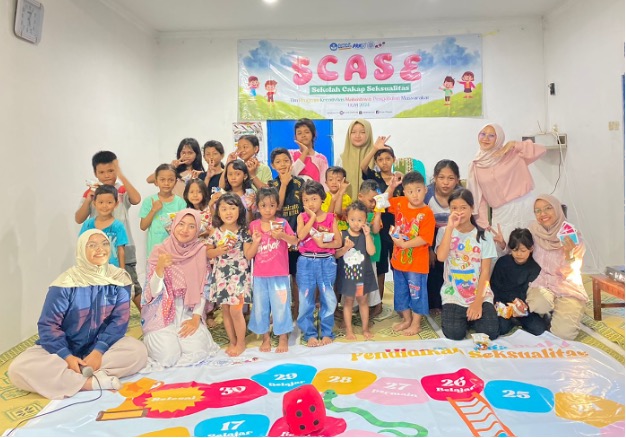
Based on the issue the team from UGM consists of Hafifah Nur Ainiyah (Biology 2022), Aulia Robiatul Adawiyah (Biology 2022), Diyan Ulsa (Psychology 2022), Danila Nur Rahmawati (Environmental Geography 2022), and Alma Puska Falasyifa (Biology 2022), under the guidance of Dr. Dwi Sendi Priyono, S.Si., M.Si conducted community service program titled “SCASE: School of Sexuality Education through Smart Snakes and Ladders Game as a Character-Building Medium for Kampung Terban Residents,” focuses on delivering age-appropriate sexual education, as recommended by WHO, through an interactive Snakes and Ladders game. This method ensures that the material is both well-understood and engaging.
Through the SCASE program, Hafifah and her team aim to enhance the welfare of the local community by empowering Desa Mitra. They use socialization, education, and training with the youth organization Karang Taruna Kampung Terban RW 5 (R05TER). Adina, a member of R05TER, stated, “There is a desire among the community to learn about sexual education, but they are still confused about where to start because it is considered a taboo topic, and there has never been a sexual education outreach program in this village.”
Supriyanto, the head of RW 5 Kampung Terban, said, “This program greatly assists the community, especially parents, who are unsure how to start discussions on sexual education with their children. It has had a very positive impact, particularly on children, who now understand which parts of their bodies should not be touched by others and know how to protect themselves to prevent sexual violence.”
The program expected to provide proper sexual education for residents Kampung Terban RW 5, and the community will be better prepared to face potential cases of sexual violence. It also hoped that the program would inspire other initiatives focused on sexual education, whether by the government or other community empowerment organizations. Author: Hafifah Nur Ainiyah.
The rapid advancement of technology has caused significant concern among the residents of Kampung Terban, particularly in RW 5, due to the rise in juvenile delinquency. Addressing technological advancement requires anticipation and preparation to mitigate its negative impacts. One such negative impact is sexual violence, proven by easy access to pornography on the internet, cases of cybersex, and promiscuity among children and teenagers. Even though Kampung Terban RW 5 is close to Universitas Gadjah Mada (UGM), sexual education has not yet reached the residents of Kampung Terban RW 5. The societal taboo on sex education is a reason sexual education is rarely taught by parents or teachers in schools. However, sexual education is a crucial foundation for reducing cases of sexual violence.
Based on the issue the team from UGM consists of Hafifah Nur Ainiyah (Biology 2022), Aulia Robiatul Adawiyah (Biology 2022), Diyan Ulsa (Psychology 2022), Danila Nur Rahmawati (Environmental Geography 2022), and Alma Puska Falasyifa (Biology 2022), under the guidance of Dr. Dwi Sendi Priyono, S.Si., M.Si conducted community service program titled “SCASE: School of Sexuality Education through Smart Snakes and Ladders Game as a Character-Building Medium for Kampung Terban Residents,” focuses on delivering age-appropriate sexual education, as recommended by WHO, through an interactive Snakes and Ladders game. This method ensures that the material is both well-understood and engaging.
Through the SCASE program, Hafifah and her team aim to enhance the welfare of the local community by empowering Desa Mitra. They use socialization, education, and training with the youth organization Karang Taruna Kampung Terban RW 5 (R05TER). Adina, a member of R05TER, stated, “There is a desire among the community to learn about sexual education, but they are still confused about where to start because it is considered a taboo topic, and there has never been a sexual education outreach program in this village.”
Supriyanto, the head of RW 5 Kampung Terban, said, “This program greatly assists the community, especially parents, who are unsure how to start discussions on sexual education with their children. It has had a very positive impact, particularly on children, who now understand which parts of their bodies should not be touched by others and know how to protect themselves to prevent sexual violence.”
The program expected to provide proper sexual education for residents Kampung Terban RW 5, and the community will be better prepared to face potential cases of sexual violence. It also hoped that the program would inspire other initiatives focused on sexual education, whether by the government or other community empowerment organizations. Author: Hafifah Nur Ainiyah.
Yogyakarta, 20 July 2024 — The Faculty of Biology, Universitas Gadjah Mada (UGM) held the 8th National Seminar on Tropical Biology (SNBT) on 20 July 2024. This year, the seminar was held in a hybrid with “Biosecurity Innovation and Tropical Biodiversity Conservation” theme. This event, which was held at the Auditorium of the Faculty of Biology, aims to provide a platform for academics, researchers, practitioners and students to discuss current issues and innovative solutions in biosecurity and biodiversity conservation in tropical regions. This seminar activity began with a report from Dr. Siti Nurbaiti as chair of the 2024 SNBT Committee, followed by remarks by Prof. Dr. Mirwan Ushada, Director of Research representing the Rector of UGM and opened by Prof. Dr. Budi Setiadi Daryono. M.Agr.Sc., as Dean of the Faculty of Biology UGM. This seminar was attended by around 100 participants from 21 institutions in Indonesia. On this occasion, an MoU was also signed between the Faculty of Biology UGM and PT. Rentokil Indonesia. It is hoped that this collaboration can be a form of synergy between academics and industry, especially regarding the issue of biosecurity and Indonesian biodiversity.
As the first keynote speaker, Ir. Medrilzam from BAPPENAS raised the topic “The Role of Government Policy for Biodiversity Conservation”. In his presentation, Ir. Medrilzam delivered the Indonesian Biodiversity Strategy and Action Plan (IBSAP), the Indonesian government’s strategy for preserving biodiversity, and how these policies are expected to shape people’s behavior towards a positive nature.
As the second speaker, Drs. Heri Susanto from PT. Rentokil Indonesia discussed “The Role of Biological Science and Digital Technology in Sustainable and Environmentally Friendly Pest Control”. In this session, Drs. Heri Susanto conveyed the exploration of the integration of biological science with digital technology to develop pest control methods that are more effective and environmentally friendly.
The third speaker, Mrs. Rina Sri Kasiamdari, Ph.D. delivered material on “The Role of Fungi in Biosecurity and Biodiversity Conservation”. The focus of this discussion is the role of fungi as biosecurity agents in maintaining biodiversity, as well as how fungi can be used in conservation efforts.
The plenary session of the three speakers was enlivened with questions from seminar participants ranging from biodiversity protection related to infrastructure developments to opportunities for food source options with high nutrition from the variety of diversity that Indonesia has to meet food needs and in terms of handling. pest. The seminar activities were continued with parallel sessions filled with presentations by the participant speakers on various research titles, which were carried out offline and online.
The 8th SNBT in 2024 was closed by Dr. Eko Agus Suyono, M.App.Sc., as Vice Dean for Research, Community Service, Collaboration and Alumni Affairs. In his closing remarks, he said that SNBT is a forum for increasing understanding of biosecurity and tropical biodiversity conservation through in-depth discussions with experts in the field, thereby inspiring innovation and collaboration between academics, researchers and practitioners in efforts to protect biodiversity, encourage policy development and new strategies that can be implemented to preserve the environment and support the sustainability of tropical ecosystems. It is also hoped that this national seminar will create synergistic cooperation between the participants who attend, which is expected to be a positive thing that can build and provide more impact regarding issues related to the topic of biosecurity and tropical biodiversity conservation in the future. Furthermore, this seminar plays a role in implementing several points of Sustainable Development Goals (SDG’s): 2. Zero hunger, 3. Good health and well-being, 4. Quality education, 6. Access to clean water and sanitation, 7. Affordable and clean and energy, 9. Industry, innovation and infrastructure, 11. Sustainable cities and communities, 13. Climate change action, 14. Maintaining marine ecosystems, 15. Maintaining land ecosystems and 17. Partnerships for the goals.
The UGM Biology team, consisting of Irfan Agus Nugroho (Biology 2021), Laila Nurul Ilma (Biology 2021), and Fika Zulfiani (Biology 2021), successfully earned a Bronze Medal Quartile nomination in the Scientific Paper competition at the Agritech Research and Entrepreneurship Innovation (AGREETION) 2024. The subtheme of their entry was “Environmental Sustainability Innovation.” AGREETION 2024 is an international scientific paper and business plan competition organized by the Agritech Research and Study Club (ARSC) of the Faculty of Agricultural Technology, Universitas Brawijaya. This year’s theme was “Accelerating Agriculture and Agro-Industry Towards Sustainable Welfare with Eco-Friendly and Clean Production Principles.” Forty-two universities from 3 countries participated in this competition that was held online from April 20 to June 1, 2024.
The team presented an essay titled “Algae Screens: Eco-friendly Sunscreen Based on Red Algae (Palmaria palmata) as an Effort to Prevent Damaged Coral Reef Ecosystems.” The paper was inspired by Indonesia’s abundant coral reefs, which are threatened by degradation, partly due to sunscreen chemicals dissolving in the water. Chemicals in conventional sunscreens, oxybenzone and octinoxate can lead to coral bleaching. As a result, research conducted to develop eco-friendly sunscreen from natural ingredients. The natural compounds focused in this research were Mycosporine-Like Amino Acids (MAAs), abundant in red algae like Palmaria palmata. The research employed a literature study and molecular docking methods between MAA compounds (mycosporine glycine, porphyra-334, and shinorine) as ligands and the target protein Procollagen C-endopeptidase 1 (PCOLCE1). PCOLCE1 is a protein involved in regulating skin aging due to UV exposure, while the three MAA compounds used are known to possess the best antioxidant properties among MAA compounds. The research found that all three MAA compounds could bind to the target protein PCOLCE1, with porphyra-334 being the most effective. Therefore, the Algae-Screen product has the potential to be an effective natural sunscreen alternative to prevent photoaging while being safe for coral reef ecosystems. However, further research is needed to develop and refine the Algae-Screen formulation.
Author: Irfan Agus Nugroho

